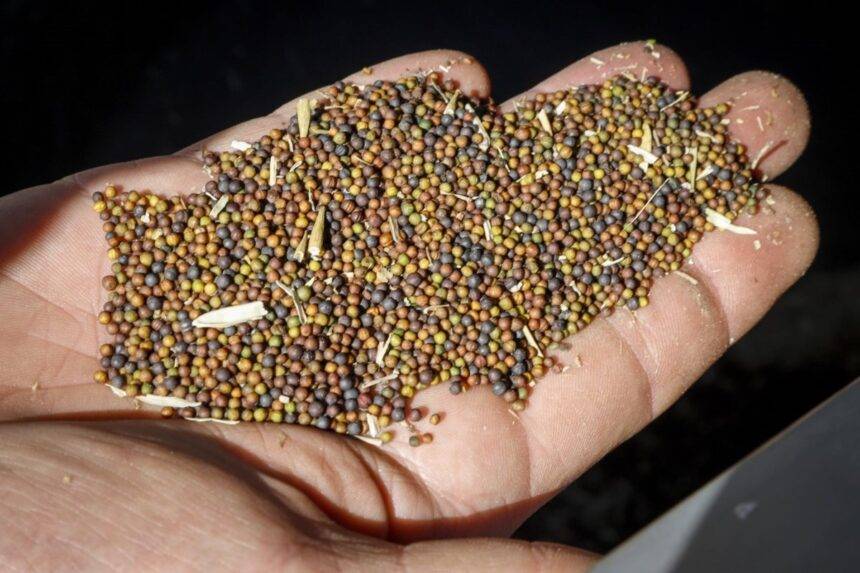Main Points In Hindi (मुख्य बातें – हिंदी में)
-
टैरिफ की संभावना: डोनाल्ड ट्रम्प के उद्घाटन के साथ कनाडा का कृषि उद्योग अमेरिकी टैरिफ के संभावित कार्यान्वयन का सामना कर रहा है, जिससे उत्पादकों को देश के सबसे बड़े व्यापारिक भागीदार तक सीमित पहुंच के कारण समस्याएँ हो सकती हैं।
-
अर्थशास्त्र पर प्रभाव: कनाडाई खाद्य आपूर्ति श्रृंखला की अमेरिका के साथ गहरी एकीकरण के कारण, टैरिफ व्यापार की लागत बढ़ाने और उच्च मुद्रास्फीति का कारण बन सकते हैं, जिससे कनाडाई उत्पादकों के मुनाफे पर नकारात्मक असर होगा।
-
कैनोला और गोमांस निर्यात: कनाडा के कैनोला और गोमांस निर्यात अमेरिका के लिए अत्यधिक महत्वपूर्ण हैं; टैरिफ के प्रभाव के कारण, उत्पादक नए बाजारों की तलाश कर सकते हैं, हालांकि अमेरिका जैसे बड़े बाजार को प्रतिस्थापित करना कठिन है।
-
बातचीत की रणनीतियाँ: कनाडाई कृषि संघों को उम्मीद है कि वर्तमान व्यापार समझौते में विवाद समाधान तंत्र टैरिफ पर बातचीत के लिए मार्गदर्शन करेगा, खासकर ट्रम्प के संरक्षणवादी दृष्टिकोण के खिलाफ।
- स्थानीय उत्पादन और विविधीकरण: कनाडा कृषि उद्योग में संभावित व्यापार व्यवधानों को कम करने के लिए स्थानीय प्रसंस्करण क्षमता का विस्तार कर रहा है और विभिन्न बाजारों में अधिक विविधता लाने का प्रयास कर रहा है, खासकर एशिया के क्षेत्र में।
Main Points In English(मुख्य बातें – अंग्रेज़ी में)
Here are the main points summarized from the article:
-
Impact of Potential Tariffs: As Donald Trump’s inauguration approaches, Canada’s agricultural industry is anxious about the possibility of the 25% tariffs he has threatened to impose on Canada and Mexico, which could lead to higher consumer prices and challenges for producers reliant on their largest trading partner.
-
Concerns for Canadian Exports: The Canadian economy is heavily integrated with the U.S. food supply chain. Tariffs could reduce profit margins for Canadian farmers, including significant exports like canola, which saw around $8.6 billion in sales to the U.S. in 2023.
-
Response and Strategy: Canadian leaders, including Prime Minister Justin Trudeau, emphasize the need for a unified approach in dealing with the new U.S. administration. Agricultural sectors are exploring diversification strategies to mitigate dependence on U.S. markets.
-
Effects on Consumers and Inflation: Experts warn that U.S. consumers may face higher inflation initially, which would eventually impact Canadian farmers and consumers as costs rise for imported goods, especially food products.
- Shift in Global Trade Dynamics: The changing political landscape signifies a potential move towards more localized processing and manufacturing, with a growing focus on diversification within Canadian agricultural exports to non-U.S. markets, particularly in the Asia-Pacific region.


Complete News In Hindi(पूरी खबर – हिंदी में)
जैसे ही डोनाल्ड ट्रम्प का उद्घाटन नजदीक आ रहा है, कनाडा का कृषि उद्योग यह देखने के लिए उत्सुकता से इंतजार कर रहा है कि जिस व्यापक टैरिफ की उन्होंने धमकी दी है वह पूरा होगा या नहीं।
यदि वे ऐसा करते हैं, तो उत्पादकों को देश के सबसे बड़े व्यापारिक भागीदार तक सीमित पहुंच के कारण पैदा हुई कमियों को दूर करना होगा और उपभोक्ताओं को अधिक कीमत चुकानी पड़ सकती है।
कैनोला काउंसिल ऑफ कनाडा के अध्यक्ष और सीईओ क्रिस डेविसन ने कहा, “जब आपके नंबर 1 बाजार में एक नया प्रशासन आ रहा है और वे टैरिफ लगाने के अपने हित या इरादे के बारे में बात कर रहे हैं, तो निश्चित रूप से इसे नजरअंदाज नहीं किया जाना चाहिए।” .
“उसी समय… हम अतिप्रतिक्रिया नहीं करना चाहते।”
नवनिर्वाचित राष्ट्रपति ट्रम्प ने हाल ही में कनाडा और मैक्सिको को 25 प्रतिशत टैरिफ की धमकी दी थी।
कनाडा ने तेजी से प्रतिक्रिया दी है, प्रधान मंत्री जस्टिन ट्रूडो ने नए प्रशासन से निपटने के लिए संयुक्त मोर्चे की आवश्यकता बताई है और मार-ए-लागो में ट्रम्प के साथ भोजन करने के लिए उड़ान भरी है।
ऊंची कीमतों के लिए तैयार रहें
फार्म क्रेडिट कनाडा के मुख्य अर्थशास्त्री जेपी गेरवाइस ने कहा, कनाडाई खाद्य आपूर्ति श्रृंखला अमेरिका के साथ बहुत एकीकृत है।
गेरवाइस ने कहा, टैरिफ – जो अन्य देशों के सामानों पर लगाए जाते हैं – व्यापार करने की लागत बढ़ा देंगे और कनाडाई उत्पादकों के लिए मुनाफा कम कर देंगे। उन्होंने कहा, वे बाजार में अधिक अस्थिरता ला सकते हैं और कंपनियों के लिए नई व्यावसायिक योजनाएं और निवेश करना कठिन बना सकते हैं।
गेरवाइस ने कहा, “हमने अपने निर्यात आधार में विविधता लाने के लिए वर्षों से कोशिश की है, और हम कुछ हद तक ऐसा करने में कामयाब रहे हैं, लेकिन वास्तविकता यह है कि हम संयुक्त राज्य अमेरिका पर बहुत अधिक निर्भर हैं।”
“तो आर्थिक दृष्टिकोण से परिणाम निश्चित रूप से नकारात्मक होंगे।”
कैनोला कनाडा के बड़े निर्यातों में से एक है जिसे टैरिफ से नुकसान होगा।
डेविसन ने कहा, कनाडाई कैनोला के लिए अमेरिका सबसे बड़ा बाजार है। उन्होंने कहा, 2023 में, कनाडा ने अमेरिका को लगभग 8.6 बिलियन डॉलर का कैनोला निर्यात किया, जिसमें से लगभग 6.3 बिलियन डॉलर का कैनोला तेल और बाकी भोजन और बीज थे।
कनाडाई गोमांस भी अनिश्चितता में फंस गया है। कैनेडियन कैटल एसोसिएशन के कार्यकारी उपाध्यक्ष डेनिस लेक्राफ्ट ने कहा, हमारे गोमांस और जीवित मवेशियों के निर्यात का अधिकांश हिस्सा अमेरिका को जाता है: लगभग 6 अरब डॉलर का, जबकि बाकी दुनिया के 1 अरब डॉलर का।
लेक्राफ्ट और डेविसन ने कहा कि यदि टैरिफ अधिनियमित किया गया, तो निर्माता अन्य निर्यात बाजारों की ओर देखना शुरू कर देंगे क्योंकि वे मूल्य दबाव और प्रतिबंधित पहुंच से निपटते हैं।
लेक्राफ्ट ने कहा, “हमारे पास बाजार तक बहुत अच्छी पहुंच है, खासकर एशिया में, जहां मजबूत मांग है।”
“लेकिन आप संयुक्त राज्य अमेरिका जैसे विशाल बाज़ार की जगह नहीं ले सकते।”
बाजार पर नजर रखने वालों ने चेतावनी दी है कि ट्रम्प के संरक्षणवादी झुकाव के परिणामस्वरूप अमेरिकी उपभोक्ताओं को उच्च मुद्रास्फीति का सामना करना पड़ सकता है।
कैनेडियन फेडरेशन ऑफ एग्रीकल्चर के अध्यक्ष कीथ करी ने कहा, “मुझे लगता है कि शुरुआत में इसका असर अमेरिकी नागरिकों और उन उत्पादों की खरीद लागत पर होगा, लेकिन अंततः इसका असर कनाडा में किसानों पर पड़ेगा।”
अरेल फूड इंस्टीट्यूट के निदेशक इवान फ्रेजर ने कहा, लेकिन इसका प्रभाव अंततः कनाडाई उपभोक्ताओं पर भी पड़ेगा।
उन्होंने कहा कि ट्रम्प के चुनाव के बाद से कनाडाई डॉलर पहले ही ग्रीनबैक के मुकाबले कमजोर हो गया है, जो समय के साथ अमेरिका से आयात पर मुद्रास्फीति का दबाव बढ़ाएगा।
फ़्रेज़र ने कहा, कनाडा कुछ खाद्य पदार्थों के लिए अमेरिका पर बहुत अधिक निर्भर करता है, जैसे उपज – विशेष रूप से सर्दियों के दौरान।
बातचीत की रणनीतियाँ
पिछली बार जब ट्रम्प राष्ट्रपति थे, तो लंबे समय से चले आ रहे उत्तर अमेरिकी मुक्त व्यापार समझौते को खत्म कर दिया गया था और उसकी जगह कनाडा-संयुक्त राज्य अमेरिका-मेक्सिको समझौता किया गया था।
करी को उम्मीद है कि समझौता, जो 2026 में समीक्षा के लिए है, टैरिफ पर बातचीत को निर्देशित करने में मदद करेगा।
“उस समझौते के भीतर विवाद समाधान तंत्र मौजूद हैं। इसलिए उन उत्पादों पर टैरिफ लगाना, जिन्हें मुक्त व्यापार समझौते के माध्यम से अनुमति दी जानी चाहिए, समझौते में कही गई बातों के विपरीत है।”
विशेषज्ञों ने कहा है कि खतरों के वास्तविकता बनने की संभावना नहीं है, लेकिन उन्हें गंभीरता से लेना अभी भी महत्वपूर्ण है क्योंकि वे संभवतः ट्रम्प की बातचीत की रणनीति का हिस्सा हैं।
करी ने कहा, “ट्रंप बहुत हड़बड़ाहट करते हैं, लेकिन क्या वह वास्तव में हमारे उत्पादों पर टैरिफ लगाने के लिए आगे आते हैं या नहीं, यह देखने वाली बात होगी।”
उन्होंने कहा, “नए राष्ट्रपति सोच सकते हैं कि वह अपने नागरिकों के साथ सही काम कर रहे हैं, लेकिन वास्तविकता यह है कि हमारी दो प्रणालियों के एकीकरण के कारण वह अपने व्यवसायों को भी प्रभावित करने जा रहे हैं।”
‘कठिन, आसान नहीं’
फ्रेज़र ने कहा, ट्रम्प का चुनाव और उनके संरक्षणवादी वादे एक बड़े बदलाव का हिस्सा हैं जो आने वाले वर्षों में कनाडाई कृषि-खाद्य क्षेत्र को प्रभावित करेगा।
वह इसे “विघटन का युग” कहते हैं।
वैश्वीकरण के नाम पर दशकों तक व्यापार का विस्तार करने के बाद, “हम उस ओर बढ़ रहे हैं जिसे मैं इतिहास का झागदार काल कह सकता हूँ, जहाँ जलवायु परिवर्तन और ऊर्जा की कीमतों में अस्थिरता और आपूर्ति श्रृंखलाओं के आसपास चुनौतियाँ और श्रम के आसपास रुकावटें हैं … ये सभी चीजें फ्रेजर ने कहा, ”आसान नहीं, बल्कि कठिन होते जा रहे हैं।”
इस वजह से, उन्हें उम्मीद है कि आने वाले वर्षों में और अधिक तथाकथित नज़दीकियां बढ़ेंगी क्योंकि निर्यात-आधारित विकास और वैश्वीकरण अपना प्रभाव खो रहा है, जिसका अर्थ है कि स्थानीय प्रसंस्करण और विनिर्माण में निवेश करने के लिए आर्थिक तर्क मजबूत होगा।
डेविसन ने कहा, कैनोला उद्योग संभावित व्यापार व्यवधानों को कम करने के लिए पहले से ही कुछ वर्षों से काम कर रहा है।
उन्होंने कहा, “संभवत: सबसे बड़ी चीज जो हमारे उद्योग ने पिछले कुछ वर्षों में की है, और लगातार कर रहा है, वह है कनाडा में अपनी कैनोला प्रसंस्करण क्षमता का विस्तार करना।”
लेक्राफ्ट ने कहा, कनाडा एक व्यापारिक भागीदार के रूप में अमेरिका की जगह लेने में सक्षम नहीं हो सकता है, लेकिन वह अपने कृषि-खाद्य निर्यात में और विविधता ला सकता है।
उन्होंने कहा, “यह निश्चित रूप से ऐसे बाजारों में मदद करता है जहां आप अल्पावधि में अधिक उत्पाद ले जा सकते हैं, और लंबी अवधि में, हमें विश्वास है कि हम प्रशांत क्षेत्र में अपनी बाजार हिस्सेदारी को बढ़ते हुए देखेंगे।”
डेविसन ने कहा, कैनोला उद्योग अन्य बाजारों पर भी नजर रख रहा है, जिसमें इंडो-पैसिफिक के देश भी शामिल हैं, जहां फ़ीड उद्योग बढ़ रहे हैं।
उन्होंने कहा, “हम हमेशा विविधीकरण के अवसरों की तलाश में रहते हैं।”
“लेकिन… उदाहरण के लिए, जब आप संयुक्त राज्य अमेरिका के आकार के उच्च-मूल्य वाले बाज़ारों के बारे में बात कर रहे हैं, तो उस प्रकार के बाज़ार पेड़ों पर नहीं उगते।”
द कैनेडियन प्रेस की यह रिपोर्ट पहली बार 10 दिसंबर, 2024 को प्रकाशित हुई थी।
रोज़ा सबा, द कैनेडियन प्रेस
Complete News In English(पूरी खबर – अंग्रेज़ी में)
As Donald Trump’s inauguration approaches, Canada’s agricultural industry eagerly awaits to see if the broad tariffs he has threatened will be imposed.
If they are, producers may face challenges due to limited access to their largest trading partner, leading to potential shortages and higher prices for consumers.
Chris Davison, president and CEO of the Canola Council of Canada, stated, “When a new administration comes into your number one market and discusses their interest or intent to impose tariffs, it should definitely be taken seriously.”
“At the same time… we don’t want to overreact.”
The newly elected President Trump has recently threatened a 25 percent tariff on Canada and Mexico.
Canada has responded swiftly, with Prime Minister Justin Trudeau emphasizing the need for a united front in dealing with the new administration and flying to Mar-a-Lago for dinner with Trump.
Prepare for Higher Prices
JP Gervais, chief economist at Farm Credit Canada, noted that the Canadian food supply chain is heavily integrated with the U.S.
Gervais explained that the tariffs—placed on goods from other countries—would increase the cost of doing business and reduce profits for Canadian producers. This could lead to greater market instability and make it challenging for companies to develop new business plans and investments.
He added, “We have tried for years to diversify our export base, and we have succeeded to some extent, but the reality is that we rely heavily on the United States.”
“So, the economic impact will definitely be negative.”
Canola is one of Canada’s major exports that could be affected by the tariffs.
Davison mentioned that the U.S. is the largest market for Canadian canola. In 2023, Canada exported approximately $8.6 billion worth of canola to the U.S., including about $6.3 billion in canola oil and the rest in food and seeds.
Canadian beef is also caught in uncertainty. Dennis Laycraft, executive vice-president of the Canadian Cattle Association, said that most of their beef and live cattle exports—around $6 billion—go to the U.S., while the rest goes to the rest of the world for $1 billion.
Laycraft and Davison suggested that if tariffs are implemented, producers will start looking for other export markets to cope with price pressures and restricted access.
Laycraft stated, “We have very good access to markets, especially in Asia, where there is strong demand.”
“But you can’t replace a huge market like the United States.”
Market observers have warned that Trump’s protectionist stance could result in higher inflation for American consumers.
Keith Currie, president of the Canadian Federation of Agriculture, mentioned, “I believe initially, this will impact American citizens and the cost of purchasing those products, but ultimately it will also affect farmers in Canada.”
Ivan Fraser, director of the Arel Food Institute, noted that the impact will eventually be felt by Canadian consumers as well.
He indicated that since Trump’s election, the Canadian dollar has already weakened against the greenback, which will increase inflationary pressure on imports from the U.S. over time.
Fraser pointed out that Canada relies heavily on the U.S. for certain food items, particularly produce, especially during winter.
Negotiation Strategies
The last time Trump was president, he ended the long-standing North American Free Trade Agreement, replacing it with the Canada-United States-Mexico Agreement.
Currie hopes that this agreement, which is due for review in 2026, will help guide negotiations on tariffs.
“There are dispute resolution mechanisms within that agreement. So, imposing tariffs on products that should be allowed under the free trade agreement goes against what the agreement states.”
Experts indicate that the likelihood of the threats becoming reality is low, but it is still important to take them seriously as they are likely part of Trump’s negotiation strategy.
Currie stated, “Trump tends to act impulsively, but it remains to be seen whether he will actually impose tariffs on our products.”
He added, “The new president might think he’s doing the right thing for his citizens, but the reality is that due to our systems’ integration, it will also impact his businesses.”
‘Challenging, Not Easy’
Fraser remarked that Trump’s election and his protectionist promises are part of a broader shift that will affect the Canadian agricultural/food sector in the coming years. He describes it as an “era of disruption.”
After decades of expanding trade in the name of globalization, “we are moving towards what I would call a frothy period in history, where challenges around climate change, energy prices, supply chain disruptions, and labor disruptions are all making things ‘not easy, but rather hard,’” Fraser stated.
This trend leads him to predict more local investments in processing and manufacturing as export-based growth and globalization lose foothold.
Davison mentioned that the canola industry has been working to minimize potential trade disruptions for several years now.
He said, “Perhaps the biggest thing our industry has done over the last few years, and continues to do, is to expand canola processing capacity within Canada.”
Laycraft noted that while Canada may not be able to replace the U.S. as a trading partner, it can diversify its agricultural food exports.
He mentioned, “This certainly helps in markets where you can ship more products in the short term, and in the long run, we believe we will see our market share grow in the Pacific region.”
Davison added that the canola industry is also eyeing other markets, including countries in the Indo-Pacific where the feed industry is expanding.
He stated, “We are always looking for opportunities to diversify.”
“But… for example, when you’re talking about high-value markets the size of the United States, those types of markets don’t just grow on trees.”
This report by The Canadian Press was first published on December 10, 2024.
Roza Saba, The Canadian Press








